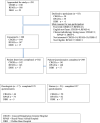On the receiving end: have patient perceptions of the side-effects of cancer chemotherapy changed since the twentieth century?
- PMID: 35015133
- PMCID: PMC8857157
- DOI: 10.1007/s00520-022-06804-1
On the receiving end: have patient perceptions of the side-effects of cancer chemotherapy changed since the twentieth century?
Abstract
Background: Studies in 1983 and 1993 identified and ranked symptoms experienced by cancer patients receiving chemotherapy. We repeated the studies to obtain updated information on patient perceptions of chemotherapy-associated symptoms.
Patients and methods: A cross-sectional interview and patient-reported outcome questionnaires were administered to out-patients receiving chemotherapy. Patients selected from 124 cards to identify and rank the severity of physical and non-physical symptoms they had experienced and attributed to chemotherapy (primary endpoint). The patient's medical oncologist and primary chemotherapy nurse were invited to rank the five symptoms they believed the patient would rank as their most severe. We analysed the association of symptoms and their severity with patient demographics, chemotherapy regimen, and patient-reported outcomes. Results were compared to the earlier studies.
Results: Overall, 302 patients completed the interview: median age 58 years (range 17-85); 56% female; main tumour types colorectal 81 (27%), breast 67 (22%), lung 49 (16%); 45% treated with curative intent. Most common symptoms (reported by >50%) were: alopecia, general weakness, effects on family/partner, loss of taste, nausea, fatigue, difficulty sleeping, effects on work/home duties, and having to put life on hold. The most severe symptoms (ranked by >15% in top five) were: concern about effects on family/partner, nausea, fear of the future, fatigue, not knowing what will happen, putting my life on hold, and general weakness. Perceptions of doctors and nurses of patients' symptom severity closely matched patients' rankings.
Conclusions: Compared to earlier studies, there was an increase in non-physical concerns such as effects on family and future, and a decrease in physical symptoms, particularly vomiting, but nausea, fatigue and general weakness remained bothersome.
Highlights: • Symptoms related to chemotherapy have changed over time, likely due to less toxic regimens and improvements in supportive care. • Effects on family/partner, fear of the future, not knowing what will happen, and "life on hold" were major issues for patients. • Vomiting has decreased but nausea, fatigue and general weakness remain common symptoms for chemotherapy patients.
Keywords: Chemotherapy; Chemotherapy side-effects; Patient-reported outcomes; Symptoms.
© 2022. The Author(s).
Conflict of interest statement
The authors declare no competing interests.
References
MeSH terms
Substances
LinkOut - more resources
Full Text Sources
Medical


